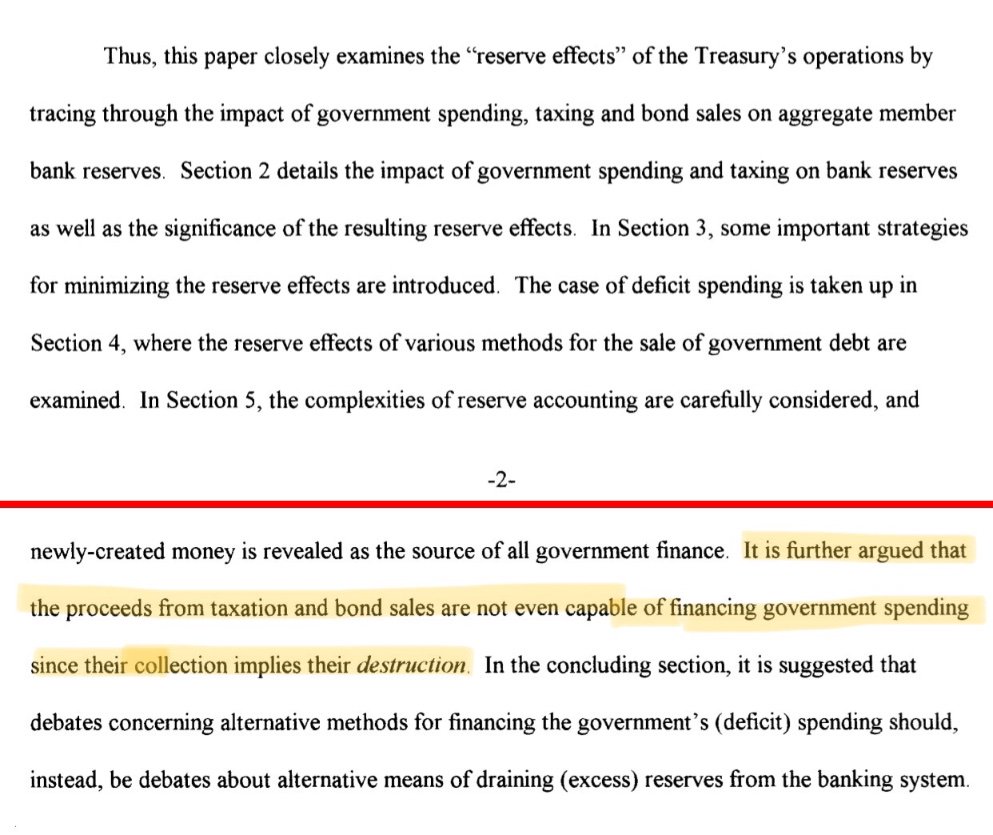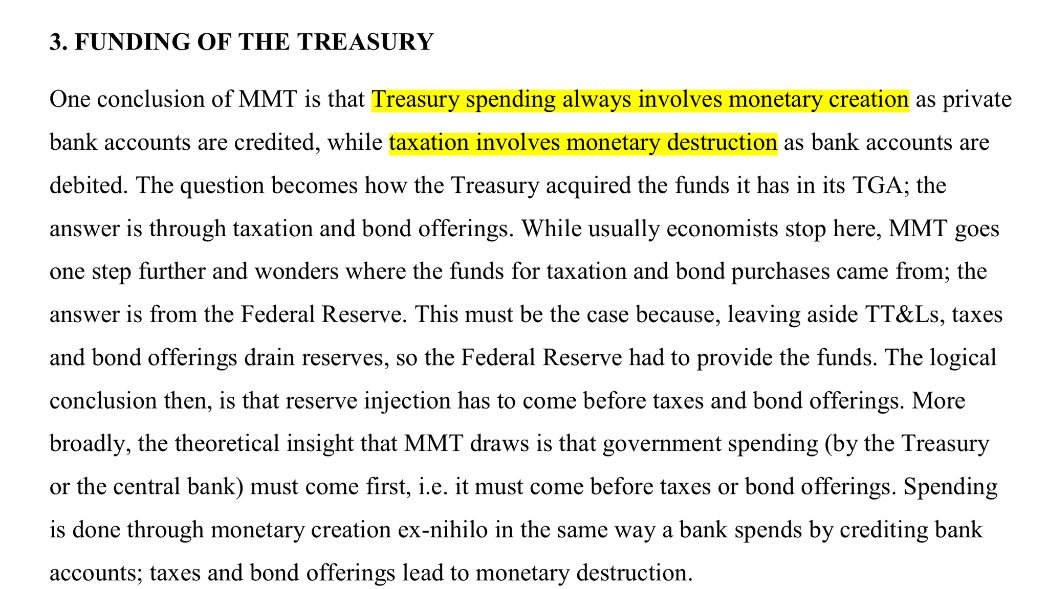1/ Where does money come from?
[#LearnMMT THREAD v.1]
Money: US: US Dollar
U.K.: British Pound
Australia: Austrailian Dollar
Canada: Canadian Dollar
China: Yuan
Japan: Yen
...
[#LearnMMT THREAD v.1]
Money: US: US Dollar
U.K.: British Pound
Australia: Austrailian Dollar
Canada: Canadian Dollar
China: Yuan
Japan: Yen
...
2/ In fiat currencies, there are two kinds of money:
1. High Powered Money (HPM), or "currency."
2. Bank loans, or "credit."
This current thread discusses only "currency." To learn about bank-created money (where banks are "franchised" by gov'ts):
1. High Powered Money (HPM), or "currency."
2. Bank loans, or "credit."
This current thread discusses only "currency." To learn about bank-created money (where banks are "franchised" by gov'ts):
https://twitter.com/citizensmediatv/status/1089898991289094146
3/ In the United States, before the first US dollar was created, no one could spend, save, invest, or pay their taxes in US dollars. This question, "Where does money come from?" must be broken into two parts:
1. Who created it? (And how?)
2. Who authorized its creation?
1. Who created it? (And how?)
2. Who authorized its creation?
4/
1. Who creates the US dollar?
The central bank (CB), which in the US is called the Federal Reserve ("the Fed"), actually creates the US dollar.
But the Fed doesn't create money just because they want to.
They only do it when they are commanded to do so by the US Treasury.
1. Who creates the US dollar?
The central bank (CB), which in the US is called the Federal Reserve ("the Fed"), actually creates the US dollar.
But the Fed doesn't create money just because they want to.
They only do it when they are commanded to do so by the US Treasury.

5/ The Treasury only does it when they are commanded to do so
by a law that was signed by the president
(after the federal budget is passed).
The bill that was signed into law by the president was written by Congress
(under the influence of big money lobbyists and donors).
by a law that was signed by the president
(after the federal budget is passed).
The bill that was signed into law by the president was written by Congress
(under the influence of big money lobbyists and donors).
6/ So:
1. Under the influence of big money
2. a number is written into a bill by Congress (representing the amount of money they believe will be necessary to implement it).
3. The bill is passed by Congress and signed by the president.
4. The federal budget is passed.
1. Under the influence of big money
2. a number is written into a bill by Congress (representing the amount of money they believe will be necessary to implement it).
3. The bill is passed by Congress and signed by the president.
4. The federal budget is passed.

7/
5. The Treasury is now commanded to
6. Command the Fed to create the money.
As far as how the Fed does it, it's called "reserve accounting," which is described in this thread:
5. The Treasury is now commanded to
6. Command the Fed to create the money.
As far as how the Fed does it, it's called "reserve accounting," which is described in this thread:
https://twitter.com/citizensmediatv/status/1099543321599459330
8/ So the answers are:
1. Who creates the money?
The central bank, which in the US is the Fed.
2. Who authorizes its creation?
According to the Constitution of the United States: Congress.
1. Who creates the money?
The central bank, which in the US is the Fed.
2. Who authorizes its creation?
According to the Constitution of the United States: Congress.
9/ Article 1, section 8 of the United States Constitution defines the power of Congress. Two of these powers are:
- "to coin money" &
- "to provide for the punishment of counterfeiting"
(Article 1 sec 8 is still in effect today because no constitutional amendment overrides it.)
- "to coin money" &
- "to provide for the punishment of counterfeiting"
(Article 1 sec 8 is still in effect today because no constitutional amendment overrides it.)

10/ ("To coin" does not refer to literal metallic coins. It is a verb phrase meaning "to create." As in, "To coin a phrase." It means that Congress can create US dollars of any kind: paper/cloth, metallic coins, electronic, etc. See: monetary.org/pdfs/home/Nate…) 

11/ Congress is the "monopoly currency issuer" of the US dollar. It is the only entity in the world that is allowed to create it.
All the rest of us – as far as the US dollar is concerned – are "currency users":
All the rest of us – as far as the US dollar is concerned – are "currency users":
12/ Currency users of the US dollar:
- me, you
- our households, businesses, cities, municipalities, and states
- other countries, such as China and Russia.
All currency users are in exactly the same position. The only difference is the amount they have.
- me, you
- our households, businesses, cities, municipalities, and states
- other countries, such as China and Russia.
All currency users are in exactly the same position. The only difference is the amount they have.
13/ Currency users must get INCOME before they can spend. Currency issuers – especially the fed gov'ts of countries with an abundance of domestically available resources* – do not need any income. (*real resources: raw materials, labor, technology, & time)
https://twitter.com/citizensmediatv/status/1101182975021060096
14/ Here is an example of a number written into a bill by Congress: $1.7 billion in 2019, and again in the following years. When this bill becomes law (and the federal budget is passed), that is the amount money ultimately created by the Fed each year. 

15/ That amount of money is created because they TYPED THAT NUMBER INTO A DOCUMENT.
Similar to a child drawing a bill onto a piece of construction paper.
Similar to ticking up the number on a scoreboard.
The money is created, because we ***want it to be created***.

Similar to a child drawing a bill onto a piece of construction paper.
Similar to ticking up the number on a scoreboard.
The money is created, because we ***want it to be created***.


16/ Finally, it is important to note the critical difference of funding in ambitious bills that benefit only the many, and those that benefit the few (i.e. military and war). Most big bills/laws that benefit the many are saddled with economically needless "pay fors."
17/ Although economically pointless, they are sinister poison pills that sabotage its passage and make it much easier to kill and dilute if passed. Hence, the nearly 90-year drum beat of, "Social Security is going broke/being stolen/borrowed from!"
https://twitter.com/citizensmediatv/status/1074853605365178369
18/18
#LearnMMT
To #LearnMMT, here is a good place to start👇. Check out my pinned tweet for more. When you’re ready, ask questions. Me and many others are here to help.
#LearnMMT
To #LearnMMT, here is a good place to start👇. Check out my pinned tweet for more. When you’re ready, ask questions. Me and many others are here to help.
https://twitter.com/citizensmediatv/status/1081598932965355520?s=21
@threadreaderapp unroll
• • •
Missing some Tweet in this thread? You can try to
force a refresh






